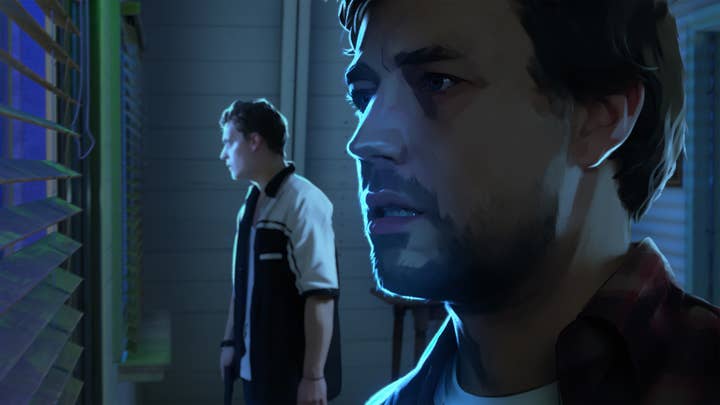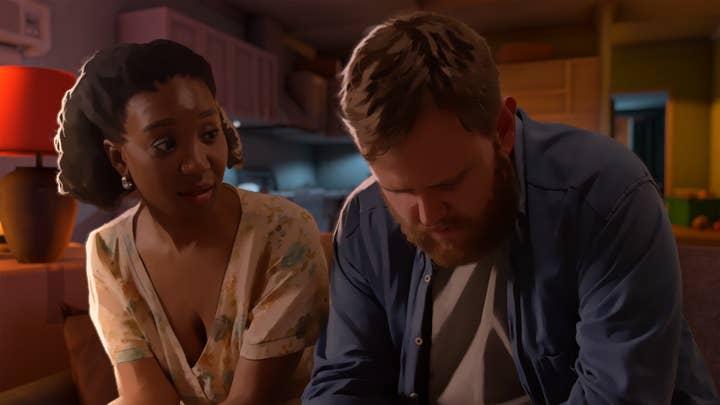The art of debate-provoking choices in As Dusk Falls
Interior Night's Caroline Marchal on why multiplayer, a Twitch mode and a companion app are key to her studio's debut title
Today sees the launch of As Dusk Falls, a narrative-driven game published by Xbox and developed by Interior Night -- the UK studio founded in 2017 by former Quantic Dream designer Caroline Marchal.
Marchal -- who led game design for the likes of Heavy Rain and Beyond: Two Souls -- told GamesIndustry.biz back when the company first opened doors that her intention with Interior Night was to bring the Breaking Bad audience, fans of prestige television, into video games.
When we catch up with Marchal at this year's Develop:Brighton, it's clear that goal has not changed. She speaks of trying to reach older and lapsed gamers, core players' partners and families, and people who think games are not for them.
"I find that depressing because games are for everyone -- they're freaking awesome," she says. "And stories are universal. People watch really complex and bold TV series with vastly different tones, so we thought: let's take some of those storylines and see how rich and complex they become once you make them interactive.

"It's super fascinating, because when you make decisions, you put a bit of yourself in every choice, and you see that with everyone you play with. Then you get these really insightful, interesting conversations about why you made that decision, what your values are, and what you stand for."
As Dusk Falls is set in 1998 Arizona. The Walker family is moving between states, but is forced to stay at a motel after a car accident. Shortly after they arrive, the Holt family -- fleeing from the authorities after a local robbery goes wrong -- takes everyone at the motel captive. What happens next is down to the player.
Or, perhaps more accurately, players. In our most recent conversation with her, Marchal tells us that the game has been "written for multiplayer from the ground up." Up to eight players can join in across a multitude of platforms, using either controllers, keyboard and mouse, or even a free mobile companion app to vote on choices that dictate the course of the story. The latter has been particularly important in making the game as accessible as possible.
"No one has eight controllers at home, but everyone has a phone and everyone knows how to use it," she says. "It's very simple gestures, everyone has a cursor and you vote for the choice or interaction you want. The majority wins, and if there's a split, there's a cool mechanic to solve that and let people discuss it a bit more.
"There's also a very fun mechanic called Override -- it's like a takeover token, you've got a limited amount per player per chapter, that lets you take control for a limited time. That's something to use when you feel really strongly about a choice
-- but even when you override, you can be overridden."
"I'd rather someone watch it than not be aware of it at all - and I would want to make this story mine."
If all this sounds familiar, it's because this has been attempted before. Perhaps the highest profile example is The Imaginati's Planet of the Apes: Last Frontier, a narrative game based on the rebooted film series. This also had multiplayer voting, and smartphone compatibility thanks to its inclusion in Sony's short-lived PlayLink range, which also encompassed other narrative games controlled by apps.
Despite their promise, neither seemed to take off -- but Marchal is confident As Dusk Falls will succeed, thanks to simple and accessible mechanics, a compelling story and the fact this is a "very interactive lean-in experience."
"You get a choice every 20 second on average, so you can't lean back and watch the game," she says. "You're playing this game so you've got to lean in. And the phone is so obvious -- everyone has one so why not use it for this sort of game?
"We're also trying to go to where players are by being really versatile and adaptable. You can play local, online, a mix of platforms, you can play on Twitch, on Xbox Cloud Gaming with touch input. So it looks like a narrative game, but there's a really big machine behind it and we're trying to accommodate as many types of players as possible. It could be you and your wife at home, playing with your sister online, sharing the same story."
It's not enough to support multiple players; you've also got to ensure there's division among them. Many branching narratives in games come down to binary choices of left or right, good action or bad action, and these are unlikely to provoke the type of conversations Marchal hopes to start. There's no sense having an override mechanic if you're not generating strong enough opinions that compel players to use it.
"For each choice, we imagined what we thought very different people might choose, thinking about how everyone might have a different point of view," says Marchal. "I think it comes with the story, which is very relatable. It's about flawed people in a difficult situation. When you play, it's not about how quick your reflexes are, it's about your life experience. So maybe if you play with your mum, she'll be more cunning than you on some choices.
"It's about simple, relatable questions, like can you start over by uprooting your family and moving to a different town or city? What happens when your family, people you love, asks something of you that conflicts with your morals? The story is weaved into the fabric of life. It's a crime drama; the crime bit is the hostage situation, it's a pressure cooker with big stakes. But there's also the relationship choices -- are you going to stay married to your wife? What's best for your daughter? Should she skip a grade or not? You're already moving, so is that too much change?"

As Dusk Falls gains extra visibility by launching on Xbox Game Pass, as well as being available for standalone purchase. While the role of subscriptions in the industry's future is still unclear, Marchal is confident it aids with discoverability, surfacing titles that "some gamers might dismiss." The gameplay of a title like this may not be as appealing to subscribers as shooters and action games, but the Interior Night founder is confident that stories can help break through this.
"Narrative titles are not universal... yet," she says. "Everything around us is a story, stories help us make sense of the world. We all consume loads of linear stories but interactive stories are even more brilliant, so I think it should be one of the genres that helps broaden the reach of video games, really breach the stigma of gamers and non-gamers. Subscriptions can bring more people into the narrative genre, and then hopefully they'll share that experience."
There's also a parallel with the world of prestige TV that the team is targeting. Subscription services such as Netflix have invested heavily in providing a variety of high-production series that appeal to different audiences, but word-of-mouth will encourage subscribers to step out of their comfort zone and try something new (if only to see what all the fuss is about). Subscriptions services create communities, Marchal says, and people who are keen to talk about what they are enjoying.
One last in-road to broadening the audience for As Dusk Falls is the Broadcast Mode, which enables Twitch streamers to integrate the game into their feed and have users vote on the next choice through the chat. There is the danger, of course, that people will simply watch through the game on livestreams rather than buy it themselves, but Marchal is confident that at least some will be converted.
"We can't guarantee [they'll buy] but the game is so branching , they'll have only seen one version of the story," she concludes. "And it's not their version because they might have made different choices, taken the characters on different journeys.
"I'd rather someone watch it than not be aware of it at all -- and I would want to make this story mine."

